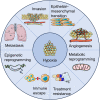Hypoxic tumor microenvironment: Destroyer of natural killer cell function
- PMID: 38751439
- PMCID: PMC11090795
- DOI: 10.21147/j.issn.1000-9604.2024.02.04
Hypoxic tumor microenvironment: Destroyer of natural killer cell function
Abstract
In recent years, immunotherapy has made remarkable progress in treating certain tumors and hematological malignancies. However, the efficacy of natural killer (NK) cells, which are an important subset of innate lymphocytes used in anticancer immunotherapy, remains limited. Hypoxia, a critical characteristic of the tumor microenvironment (TME), is involved in tumor development and resistance to radiotherapy, chemotherapy, and immunotherapy. Moreover, hypoxia contributes to the impairment of NK cell function and may be a significant factor that limits their therapeutic effects. Targeted hypoxia therapy has emerged as a promising research area for enhancing the efficacy of NK cell therapy. Therefore, understanding how the hypoxic TME influences NK cell function is crucial for improving antitumor treatment outcomes.
Keywords: Hypoxia; NK cell; immunotherapy; tumor microenvironment.
Copyright ©2024 Chinese Journal of Cancer Research. All rights reserved.
Figures


Similar articles
-
Combined use of NK cells and radiotherapy in the treatment of solid tumors.Front Immunol. 2024 Jan 9;14:1306534. doi: 10.3389/fimmu.2023.1306534. eCollection 2023. Front Immunol. 2024. PMID: 38264648 Free PMC article. Review.
-
Unleashing Natural Killer Cells in the Tumor Microenvironment-The Next Generation of Immunotherapy?Front Immunol. 2020 Feb 21;11:275. doi: 10.3389/fimmu.2020.00275. eCollection 2020. Front Immunol. 2020. PMID: 32153582 Free PMC article. Review.
-
Targeting Natural Killer Cells for Tumor Immunotherapy.Front Immunol. 2020 Feb 19;11:60. doi: 10.3389/fimmu.2020.00060. eCollection 2020. Front Immunol. 2020. PMID: 32140153 Free PMC article. Review.
-
Design and Implementation of NK Cell-Based Immunotherapy to Overcome the Solid Tumor Microenvironment.Cancers (Basel). 2020 Dec 21;12(12):3871. doi: 10.3390/cancers12123871. Cancers (Basel). 2020. PMID: 33371456 Free PMC article. Review.
-
Cytokines Orchestrating the Natural Killer-Myeloid Cell Crosstalk in the Tumor Microenvironment: Implications for Natural Killer Cell-Based Cancer Immunotherapy.Front Immunol. 2021 Jan 29;11:621225. doi: 10.3389/fimmu.2020.621225. eCollection 2020. Front Immunol. 2021. PMID: 33584718 Free PMC article. Review.
Cited by
-
Adaptation of Natural Killer Cells to Hypoxia: A Review of the Transcriptional, Translational, and Metabolic Processes.Immunotargets Ther. 2025 Feb 18;14:99-121. doi: 10.2147/ITT.S492334. eCollection 2025. Immunotargets Ther. 2025. PMID: 39990274 Free PMC article. Review.
-
Killing the killers: Natural killer cell therapy targeting glioma stem cells in high-grade glioma.Mol Ther. 2025 Jun 4;33(6):2462-2478. doi: 10.1016/j.ymthe.2025.02.043. Epub 2025 Mar 3. Mol Ther. 2025. PMID: 40040281 Review.
-
The Role of NK Cells in Cancer Immunotherapy: Mechanisms, Evasion Strategies, and Therapeutic Advances.Biomedicines. 2025 Apr 2;13(4):857. doi: 10.3390/biomedicines13040857. Biomedicines. 2025. PMID: 40299429 Free PMC article. Review.
-
Chimeric Antigen Receptor Cell Therapy: Empowering Treatment Strategies for Solid Tumors.Curr Issues Mol Biol. 2025 Jan 31;47(2):90. doi: 10.3390/cimb47020090. Curr Issues Mol Biol. 2025. PMID: 39996811 Free PMC article. Review.
References
LinkOut - more resources
Full Text Sources
